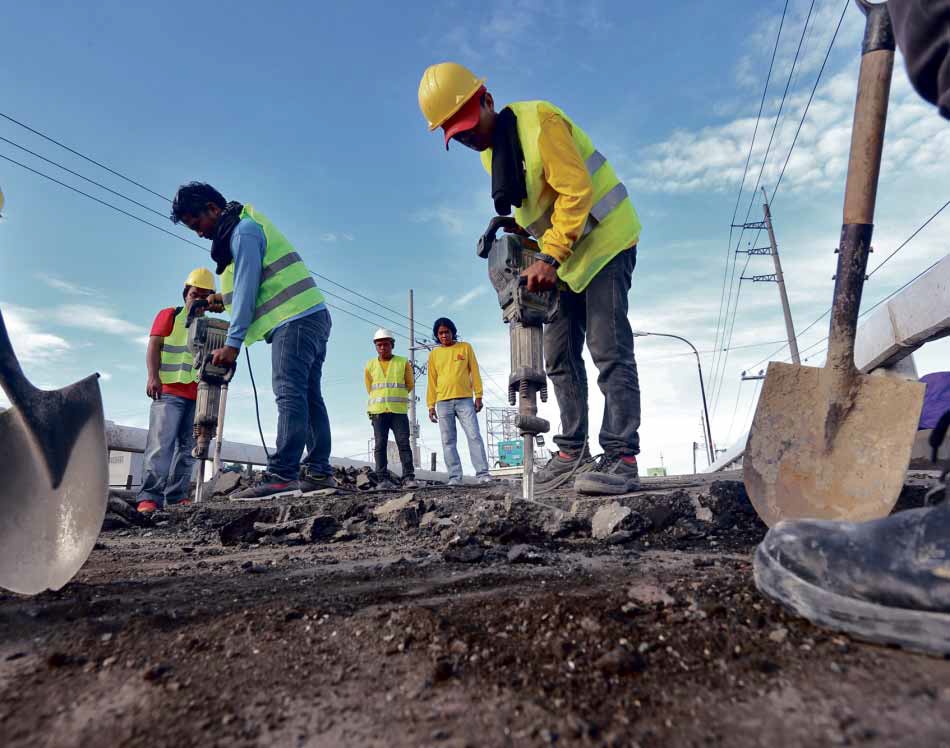Business leaders stay upbeat on admin’s infra push

P8-TRILLION INITIATIVE Under its “Build, Build, Build” program, the Duterte administration will spend over P8 trillion during its six-year term so that the share of infrastructure spending in the country’s gross domestic product will rise from 5.3 percent this year to 7.4 percent in 2022. —INQUIRER PHOTO
A year after President Rodrigo Duterte took office, some of the biggest local and foreign business chambers in the country still have high hopes for the administration, betting on the promise of a “golden age of infrastructure” on top of a proinclusive growth and probusiness legislative agenda.
Business groups interviewed by the Inquirer want the Duterte administration to keep its sight focused on the 10-point socioeconomic agenda, which Mr. Duterte’s team unveiled before the President’s inauguration to provide the private sector an overview of the government’s plans.
The agenda included speeding up infrastructure spending to eventually account for 5 percent of the gross domestic product (GDP), “with public-private partnerships (PPP) playing a key role.”
Much has changed since last year, with the government placing PPP in the backseat to the disappointment of some business leaders. Economic managers have decided on a hybrid plan of implementation under which the public sector would build the infrastructure then bid out the operation and maintenance to the private sector.
P8T for infra
Under the “Build, Build, Build” (BBB) initiative, over P8 trillion will be spent by the administration during its six-year term so that the share of infrastructure spending in the GDP will rise from 5.3 percent this year to 7.4 percent in 2022.
Article continues after this advertisementApart from the infrastructure promise, Mr. Duterte’s first year also brought concerns among members of the business community as he pivoted toward China and Russia at the expense of long-term allies — the United States and the European Union.
Article continues after this advertisementThere was also concern for the mining industry, which faced controversial orders of mine closures and suspensions under then Environment Secretary Gina Lopez.
Despite these, business remained generally supportive of the administration, while noting that the economic managers should keep an open dialogue with the private sector.
‘Integrity Initiative’
“One year is certainly not enough to realize gains of their BBB infrastructure program, but we just cannot stress enough how important the infrastructure projects are to address transport woes and logistics constraints as well as to make our country more competitive vis-a-vis our Asean (Association of Southeast Asian Nations) neighbors,” said Peter Perfecto, Makati Business Club executive director.
Perfecto added that Malacañang should issue an executive order that would institutionalize government support for the private sector-led “Integrity Initiative,” which sought to promote ethical and acceptable integrity standards in the business community and other sectors.
He said an executive order would “provide a framework for more cooperation in addressing corruption on both the public and private spheres.”
John Forbes, senior adviser of the American Chamber of Commerce of the Philippines (AmCham), said the Duterte administration had “managed the economy well,” citing reduced unemployment, modest inflation and a record $7.9 billion in foreign direct investments last year.
12 legislative priorities
Moreover, Forbes said he would like the government to enact the 12 legislative priorities of business groups in the country. The list was detailed in a Jan. 19 letter to Executive Secretary Salvador Medialdea.
The groups said the measures would improve the country’s business and economic climate.
The 12 reforms, arranged according to their importance, are constitutional amendments (easing of foreign equity restrictions); comprehensive tax reform package; apprenticeship program reform; build-operate-transfer law amendments; freedom of information; Corporation Code amendments; Public Service Act amendments; telecommunication sector reforms; water sector reform; bank secrecy law amendments; emergency powers to deal with traffic and transportation crises; and retail trade law amendments.
Reviving mining industry
“In the next five years, we would like to see the BBB projects well on their way to completion, the 12 legislative priorities of the foreign and domestic business groups enacted, revival of the mining industry, strong growth in the country’s neglected agricultural sector and achievement of the administration’s goal of reducing poverty by 1.5 percent a year,” Forbes said.
While otherwise supportive of the administration, AmCham warned late last year that the drug war as well as Mr. Duterte’s insults to then US President Barack Obama could “harm the longstanding optimism of American business to invest in the Philippines.”
Guenter Taus, president of the European Chamber of Commerce of the Philippines, said European investors remained “strongly interested” in the country, noting strong ties as the bloc accounted for the largest export market for Philippine companies in March.
“We feel that the Philippines is still at large interesting for foreign investments because of its macroeconomic fundamentals despite recent events, such as the declaration of martial law in Mindanao and the Resorts World incident, which have indeed caused concern,” Taus said.
“We are also looking forward to the fast action that the administration needs to undertake on the ease of doing business and the speedy implementation of infrastructure projects. Both are indeed crucial in making the Philippines a competitive investment destination and in spurring economic growth,” he added.
Enhanced PH visibility
George Barcelon, Philippine Chamber of Commerce and Industry president, said “the visibility of the country has been quite enhanced” due to Mr. Duterte’s foreign trips as Asean chair as well as his visits to powerful economic countries, such as China and Japan.
While there have been advances and missteps, Barcelon expressed confidence in the administration’s direction.
“They have the 10-point socioeconomic pillars. In the next five years, just follow that. Fast-track that and I think we would be much better off than we are today,” he said.